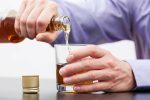Content
Fewer D1 receptors would make the brain less responsive to dopamine, causing an individual to struggle in order to feel the same euphoric rush from alcohol that others may experience. Dopamine has also been implicated in schizophrenia and ADHD; the brain systems underlying these conditions (as well as substance abuse disorder) are complex. The activity of the dopamine system depends on the state of one’s dopamine receptors, and in people with these conditions, the chemical interacts with other factors in ways that have yet to be explained. There were 717,798 total hospital visit records in New York State for alcohol-related disorders and 794,305 for substance-related disorders during the study period (1995–2014). Admissions with missing, incomplete, or inaccurate records of sex, age, dates of admission, or residential ZIP Codes were excluded (16.4% of alcohol-related disorder and 9.2% of substance-related disorder hospital visits). This left 671,625 complete hospital visit records for alcohol-related disorders and 721,469 for substance-related disorders (Table 1).

We have facilities across the U.S. offer a full continuum of care, custom treatment plans, and comprehensive discharge plans to aid in the success of your recovery. Activities such as eating, hugging and exercising can generate dopamine production in the brain.
Hospital visits
They will simply help you change your brain’s reward system, which correlates drinking or drug use with pleasure. For some patients, the drugs have a calming effect, Kolodner explains, but what’s really happening is that the drugs themselves are normalizing how does alcohol affect dopamine the brain’s dopamine levels. The first line of evidence implicating serotonin in the development of alcohol abuse was the discovery of a relationship between alcoholism and the levels of serotonin metabolites in the urine and CSF of human alcoholics.

We also examined mRNA levels for various nAChR subunits (α4, α5, α7, and β2). Detailed methods for these assays are available in Supplementary Materials and Methods. Scientists who study neurological and psychiatric disorders have long been interested in how dopamine works and how relatively high or low levels of dopamine in the brain relate to behavioral challenges and disability. https://ecosoberhouse.com/article/writing-a-goodbye-letter-to-alcohol/ This circuit registers an intense experience (such as getting high) as “important” and creates lasting memories of it as pleasurable. Dopamine changes the brain on a cellular level, commanding the brain to do it again. A person with high levels of dopamine, whether due to temperament or to a transient—perhaps chemically induced state—can be described as a sensation seeker.
What Is Dopamine?
According to the World Health Organization, alcohol is responsible for 3 million deaths globally each year, which accounts for 5.3% of all deaths. Additionally, alcohol consumption is responsible for over 5% of the global burden of disease, with alcohol-related disorders being the leading cause of disability among young people aged 15 to 49. Even moderate users or those who have been drinking in excess for a short period of time can experience mental fog, anxiety, and mood changes. So if you’re in recovery and wondering why you’re not experiencing that “high” anymore, even from new, exciting experiences, know that your brain’s dopamine system is probably still off balance.
Seventh, due to data access restrictions, this study focused on hospital visits in total, not just first-time visits. Further work should examine the effect modification between those who make their first alcohol- or substance-related disorder hospital visits vs. re-hospitalizations. Eighth, we were not able to distinguish between those patients with permanent addresses or those without.
Behavioral and neurobiological consequences of altered dopamine signaling
You and I may have equally high levels of dopamine, but our symptoms — and experiences — will be completely different. Some individuals are more sensitive to dopamine than others, which partially explains why some of us are more susceptible to alcohol or drug use disorders. Nalmefene was significantly better than the placebo in reducing alcohol consumption. The drug was generally well-tolerated, with most side effects characterized as mild or moderate and quickly resolved.
- Read on to learn more about the myths and facts surrounding dopamine’s role in addiction.
- Furthermore, the trend toward decreased dopamine release in the males with no abstinence might have become significant had those subjects been put through abstinence periods like the male subjects in Cohort 3 of this study.
- The research team found the brains of deceased alcoholics to have fewer D1 dopamine receptors, sites in the brain where dopamine binds and excites neurons, the specialized brain cells that transmit nerve impulses.

Leave a reply